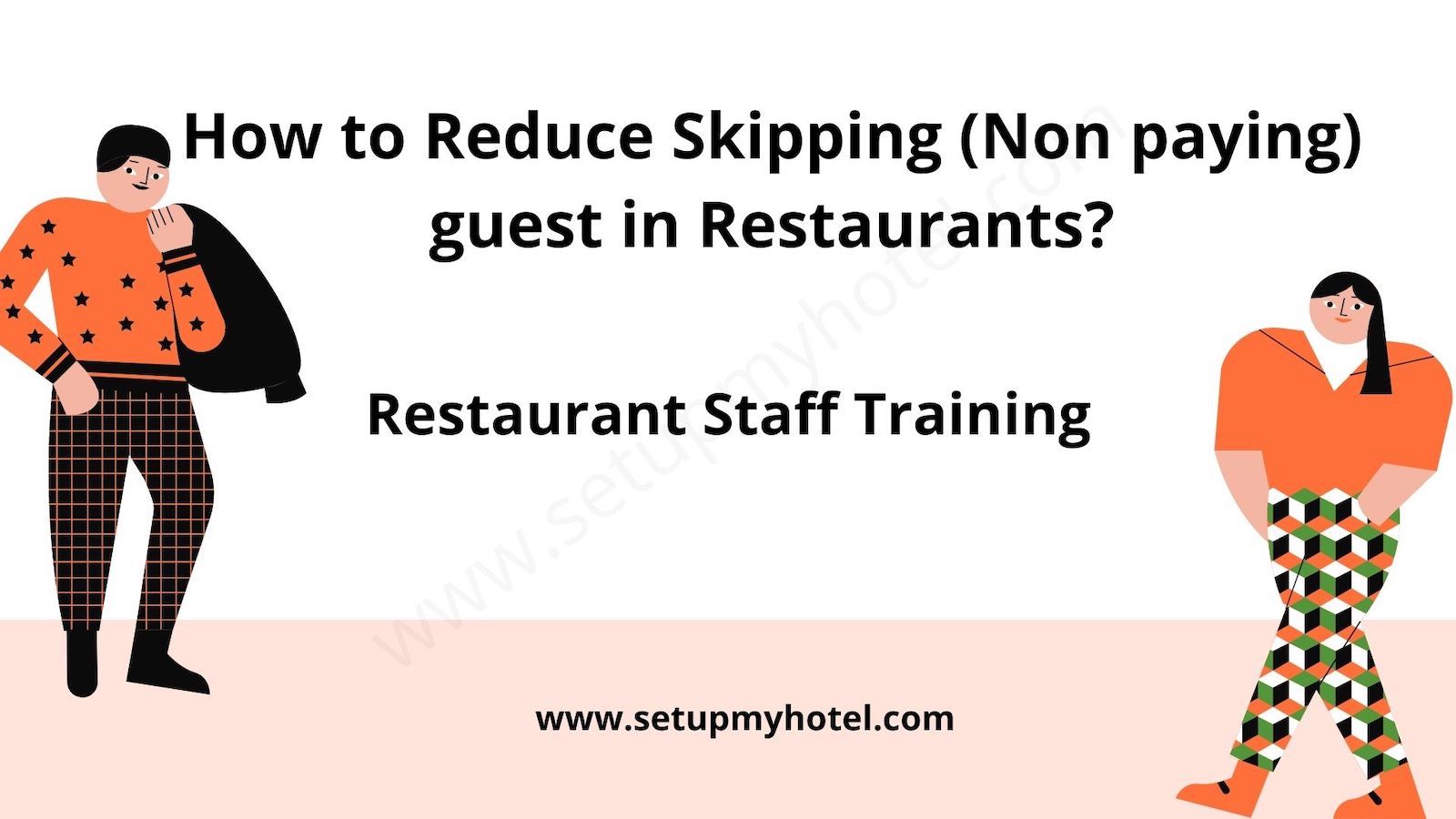How to Reduce Skipping (non-paying) guests in Restaurants?
Reducing the number of non-paying guests, commonly referred to as “skipping” or “dine-and-dash” incidents, is a priority for restaurants. Here are several strategies to help mitigate this issue:
- Implement a ReservationThe department that receives; documents and processes reservation requests. System:
- Require reservations, especially during peak hours. This helps track and manage incoming guests, making it more challenging for individuals to leave without settling their bills.
- Host Stand Monitoring:
- Train host or reception staff to be vigilant in monitoring guests entering and leaving the restaurant. Encourage them to communicate effectively with servers to ensure that each table is attended to promptly.
- Prompt Greetings and Service:
- Provide attentive and prompt service from the moment guests arrive. A quick acknowledgment and efficient service may deter potential dine-and-dash scenarios.
- Use Technology:
- Invest in point-of-sale (POSPoint-of-Sale (POS) Terminal: A cash register with the capability to scan a UPC code with a laser an...) systems that can keep real-time track of orders and payments. Some systems may even require pre-authorization for larger bills or high-risk transactions.
- Prepayment or Deposits:
- For special events or large group reservations, consider implementing prepayment or requiring a deposit. This ensures a commitment from the guests and reduces the likelihood of non-payment.
- Visible Signage:
- Display clear and visible signs indicating your restaurant’s policy on dine-and-dash incidents. This can act as a deterrent and make guests aware of the consequences.
- SecuritySecurity is the prevention of theft; fire; and other emergency situations in the workplace. Measures:
- Install security cameras in strategic locations, especially near exit points. This can deter individuals from attempting to leave without paying and provide evidence in case of an incident.
- Train Staff:
- Train staff to be observant and identify potential risks. Encourage them to communicate effectively with each other and to notify management immediately if they suspect someone may intend to leave without paying.
- Request Identification:
- In certain situations, such as with large bills or unfamiliar customers, it may be appropriate to request identification before taking an order. This can help in identifying and tracing guests if needed.
- Build Relationships with Regulars:
- Establish strong relationships with regular customers. Familiarity and a sense of community can contribute to a positive atmosphere and reduce the likelihood of non-payment incidents.
- Collaborate with Local Authorities:
- In case of recurring issues, work closely with local law enforcement. They may provide guidance or increase their presence to discourage potential offenders.
- Review and Learn from Incidents:
- Regularly review and analyze dine-and-dash incidents. Learn from each occurrence to identify patterns and areas for improvement in your restaurant’s operations.
- If the custom of the restaurant is to allow the ordering of food before receiving payment, present the bill for the food promptly when the guests have finished eating.
- If the facility has a cashier in a central location in the dining area, make sure that person is available and visible at all times.
- If the facility operates in such a manner that each server collects for his or her own guests’ charges, instruct the servers to return to the table promptly after presenting each guest’s bill to secure a form of payment.
- Be observant of all exit doors near restrooms or other areas of the facility that may give an unscrupulous guest an easy “out.”
- In a hotel dining situation, if it is the custom of the restaurant to allow food and beverage purchases to be charged to a room or master bill, verify the identity of the guest with both a printed and signed name. GuestDefinition of Guest in Hospitality Industry: A guest is the most important person in any business. A... identity verification may take a variety of forms, but in all cases should firmly establish that the guest requesting credit privileges is indeed authorized to do so.
- If an employee sees a guest leave without paying the bill, they should notify management immediately.
- Upon approaching a guest who has left without paying the bill, the manager should ask if the guest has inadvertently “forgotten” to pay. In most cases, the guest will then pay the bill.
- If the guest is successful in fleeing the scene, the police should be notified.
- In no case should staff members or managers be instructed to attempt to physically detain the guest. The liability that could be involved should an employee be hurt in such an attempt is far greater than the value of a food and beverage bill.
- Should a guest refuse to pay or flee the scene, the manager should note the following on an incident report:
- Number of guests involved.
- Amount of the bill.
- Physical description of the guest(s).
- Vehicle description, if the guests flee in a car, as well as the license plate number, if possible.
- Time and date of the incident.
- Name of the server(s) who waited on the guest.
- Name of the server who notified management of the skip.
By combining these strategies and creating a comprehensive plan, restaurants can significantly reduce the risk of non-paying guests and create an environment that discourages such incidents. It's essential to strike a balance between implementing security measures and maintaining a welcoming atmosphere for genuine customers.











